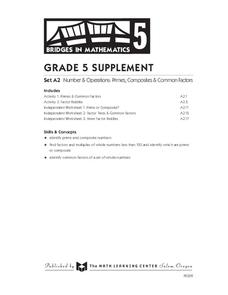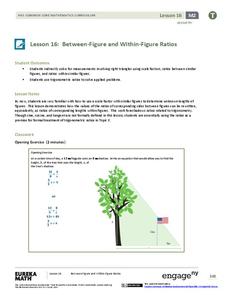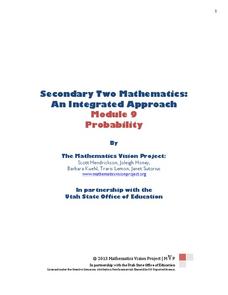EngageNY
Least Common Multiple and Greatest Common Factor
Find the common denominator between prime factors, factor trees, and the distributive property. Scholars learn to find the least common multiple and greatest common factor of pairs of numbers. They rotate through stations to connect...
Scholastic
Study Jams! Greatest Common Factor
When one method isn't enough to teach GCF, try two! This interactive webpage introduces factors and the prime factor tree to find the greatest common factor of two numbers. After the lesson, have learners click to try the two examples...
Scholastic
Study Jams! Prime Factorization
Deepen the number sense of young mathematicians by exploring the process of prime factorization. Follow along with this step-by-step presentation that explains how factor trees are used to break a composite number down into its prime...
Math Learning Center
Grade 5 Supplement Set A2 – Number and Operations: Primes, Composites and Common Factors
Incorporate riddles into your math lesson by having students make tree factors and determine if the number is a prime or composite. They will also use other clues to find the answer to the riddle while sharpening their...
Scholastic
Study Jams! Tree Diagrams
With so many toppings to chose from, make the ice cream truck combinations a fun math problem that teaches your learners about outcomes. The video introduces a tree diagram that allows your mathematicians to see how to create...
Scholastic
Study Jams! Least Common Multiple
RJ instructs your sixth graders in two different methods of determining least common multiples. The first is by listing several multiples of each number, and the second is by drawing factor trees. This is an ideal flipped classroom...
Willow Tree
Factoring Polynomials
Young mathematicians discover trees organize more than just families — they help factor, too. The lesson begins with factor trees and develops slowly to factoring by grouping and special patterns.
EngageNY
Between-Figure and Within-Figure Ratios
Tie the unit together and see concepts click in your young mathematicians' minds. Scholars apply the properties of similar triangles to find heights of objects. They concentrate on the proportions built with known measures and solve to...
Mathematics Vision Project
Probability
Probability, especially conditional probability, can be a slippery concept for young statisticians. Statements that seem self-evident on the surface often require a daunting amount of calculations to explicate, or turn out to be...





